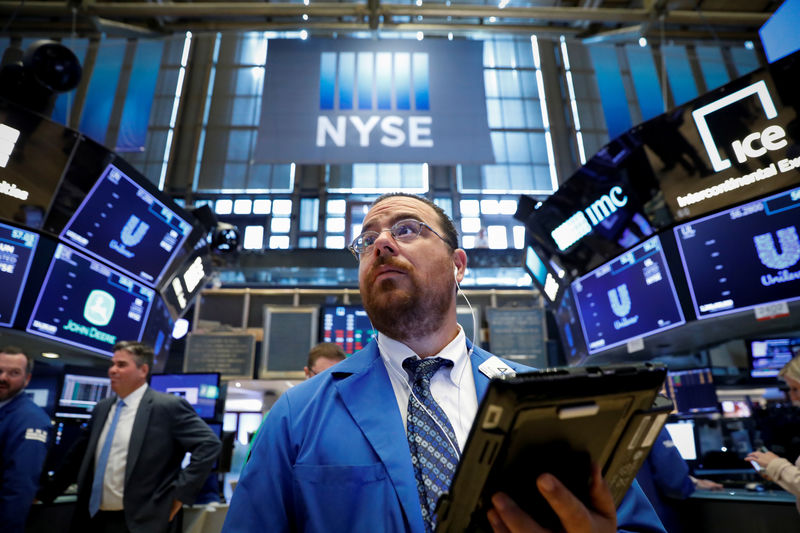By Geoffrey Smith
Investing.com -- Biden leads Trump by 10 points going into the final straights. PMIs paint a rosy picture for manufacturing in China and Europe, despite the U.K. joining the list of the locked-down. Politics and oil push the ruble to a six-month low, and Warren Buffett's Berkshire Hathaway (NYSE:BRKa) reports earnings. What's moving markets on Monday, November 2nd
1. Trump mobilizes the lawyers
A poll by The Wall Street Journal and NBC indicated that Democratic Party nominee Joe Biden leads President Donald Trump by 10 points among the electorate, by 52% to 42%, with only two days to go before presidential and congressional elections. However, the same poll indicated that Biden’s lead had narrowed to 6% or less in some key battleground states, putting some of them within the margin of error.
Trump at the weekend again signalled his intention to challenge any result that goes against him, telling reporters that: “The night of — as soon as that election is over — we are going in with our lawyers.”
He was referring in particular to the Supreme Court’s endorsement of a Pennsylvania Supreme Court ruling that will allow ballots to be counted even if they arrive up to three days after the poll. The U.S. Postal Service is struggling to deliver millions of mailed-in votes in time for Tuesday.
Under the Constitution, state legislatures and courts have control of organizing elections. The Supreme Court is understood to be anxious to stay out of the process as far as that is possible.
2. U.K. heads back to lockdown but European PMIs rise
The U.K. followed France and Germany in tightening restrictions to turn a rising tide of Covid-19 that threatens to swamp the country’s health system, Treasury chief Rishi Sunak announced a big extension of the country’s wage support schemes to support business but U.K. markets nonetheless underperformed the rest of Europe.
Eurozone markets’ better performance was due largely to an upward revision to IHS Markit’s manufacturing purchasing managers’ index for October. At 54.8, this was the highest in over two years. However, IHS reported that companies were still shedding labor and reporting longer lead times due to disruptions arising from the pandemic.
A Financial Times survey of economist suggested that the Eurozone economy will shrink by 2.3% in the fourth quarter, owing to the latest public health measures.
3. U.S. stocks set to rebound from red October
U.S. stock markets are set to rebound in early trading from their worst monthly performance since March.
By 6:45 AM ET (1145 GMT), Dow 30 futures were up 452 points, or 1.7%, while the S&P 500 futures contract was up 1.6% and Nasdaq futures were up 1.4%.
The rebound comes in spite of surging numbers of Covid-19 infections that all but ensure an increase in hospital admissions and deaths after the election, regardless of its outcome. The number of hospitalizations, at 47,000, is already up nearly 60% from September, while five of the highest daily counts of new infections have come in the last eight days. The U.S. death toll now stands at over 231,000, according to Johns Hopkins data.
4. ISM PMI, Berkshire Hathaway's and Mondelez (NASDAQ:MDLZ)' earnings due
The Institute of Supply Management will release its PMI for U.S. manufacturing at 10 AM ET in an otherwise light day for data.
The ISM number will be a counterpoint to the European and Chinese numbers released earlier by IHS and Caixin. China’s Caixin PMI rose by more than expected to its highest in over six years.
Amid corporate earnings, Berkshire Hathaway reports early, along with Mondelez, Estee Lauder (NYSE:EL) and Loews (NYSE:L). Skyworks (NASDAQ:SWKS) and Williams (NYSE:WMB) report after the closing bell.
5. Russian oil, wheat producers fret over virus, election result
The Russian ruble fell to its lowest since March and tested a new five-year low against the dollar on concerns at what awaits the country after the U.S. elections. Analysts predict tough new sanctions against Russia if the Democratic Party wins the election, as delayed punishment for the extensive Russian interference in the 2016 elections through social media and other channels.
The dollar rose as high as 80.92 rubles before retracing moderately, amidst reports of central bank intervention to support the currency. Reinforcing the trend is the continued collapse in oil prices, which hit new five-month lows over the weekend. U.S. crude futures were still below $35 a barrel by 6:30 AM ET, while Brent was just over $37 a barrel. Energy Minister Alexander Novak will reportedly meet with the country's oil producers later Monday, according to Interfax.
Another side-effect of ruble weakness is a squeeze in wheat prices in Europe, as Russian farmers reportedly hold off selling until they see how the ruble reacts to the election result.
